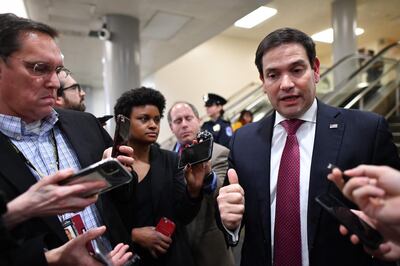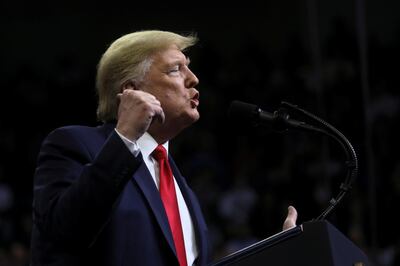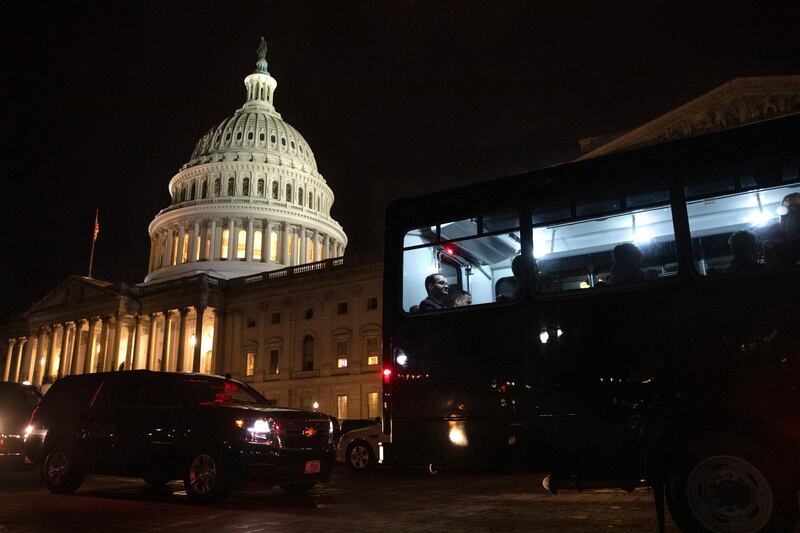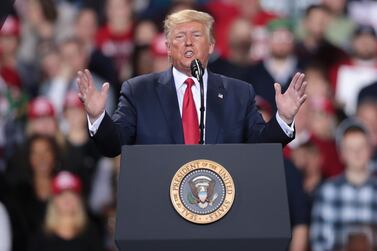As evidence surrounding US President Donald Trump and the Ukraine scandal mounts almost daily, the Republican Party-controlled Senate voted on Friday to refuse to hear any witnesses or subpoena relevant documents. He is therefore set to be acquitted next week after the only Senate impeachment “trial” in US history without any witnesses.
Truth has, predictably, been the first casualty.
The Senate did not even want to hear from John Bolton, the former national security adviser, who has written a draft book claiming that, as early as last May, the president was plotting to leverage US military aid to coerce Ukraine into publicly smearing Joe Biden, Mr Trump's potential opponent in the 2020 presidential election, as well as his son. He reportedly details the involvement of other senior figures, including Mr Trump’s lead impeachment attorney, Pat Cipollone.
On Saturday, the White House moved to suppress 24 emails that purportedly also document the president’s intentions towards Ukraine.
To justify their unprecedented aversion to information, Senate Republicans have floated some especially ridiculous arguments.

Lisa Murkowski of Alaska denounced the Democratic Party’s partisanship while joining almost all her fellow Republicans in defending their leader against the facts. She complained that the trial was not fair, but somehow blamed the House of Representatives for this – and not the White House, which suppressed critical testimony and documents, nor the Senate, including herself, which is cheerfully refusing them.
Lamar Alexander of Tennessee admitted that the Democrats proved their case against Mr Trump, but argued that, therefore, there is no need for any further evidence. He argued that while the president's actions were clearly "inappropriate", that was no reason to remove him from office, or punish him in any way. Indeed, he endorsed Mr Trump for re-election.
The party is ratifying a new and dangerous standard of presidential immunity and impunity. Mr Trump's lawyers and most elected Republicans, either implicitly or explicitly, are arguing that the removal of a president requires a criminal act that is also politically corrupt.
One Trump lawyer, Alan Dershowitz, claimed that not only would a president have to be guilty of a statutory crime, his motive would also have to be corrupt. Mr Trump therefore cannot be removed because the House only charged him with corruption and abuse of office, not a criminal act.
Mr Trump's defenders add there can be no question of corruption if, in abusing his authority, a president believes he is acting in the public interest – even if simply by securing his own re-election. If Mr Trump was trying to subvert the coming election by coercing Ukraine into smearing his opponent, so long as he believes he is the right person for the job, this theory holds that would be just fine.

This is a shocking standard, almost every element of which is a severe blow to the traditional American constitutional order. It strongly suggests that a president could, for example, try to ensure his re-election by using his vast law enforcement authority to jail his opponents en masse, and that would not be impeachable.
That would render American democracy practically meaningless.
There might be some Republican House members who sincerely believe that Mr Trump did nothing wrong or that such presidential impunity is constitutionally valid. But almost all senators know better.
Some undoubtedly fear Mr Trump's wrath and the backlash of his passionate supporters. But Mr Alexander, 79, is retiring. His example suggests that Republicans do not require ulterior motives or bizarre delusions. Ideological affiliation and pure power politics explain their eagerness to defend Mr Trump despite everything – and, indeed, to heartily endorse him for re-election.
Marco Rubio of Florida summed up this astounding position by arguing that even when there are ample grounds to remove a president, implicitly as of now, that does not mean the Senate should do it. Obviously not, if you or your party might be harmed in the process.
Republicans seem to be embracing and ratifying the White House’s argument that a sitting president cannot be charged with a crime or in any way investigated by law enforcement, can absolutely stonewall Congress, and only be impeached or removed based on this almost impossible, virtually monarchical, standard.

This all amounts to the largest expansion in presidential authority, particularly vis-a-vis Congress, in living memory.
The last democratic guardrail still standing is the presidential election in November. Even then, it is expected that, as in 2016, Mr Trump could well win with only a minority of popular votes through the quirks of the federal electoral college system.
Republican Senators point to the coming election, even though the Constitution does not provide any such impeachment exemption. It should be “left up to the people”, they said.
That flies in the face of the US constitutional system but, more importantly – and the lingering problem of minority rule aside – blatant election manipulation has already begun.
Mr Trump has just got away with an extensive effort at doing so via Ukraine. The Senate’s refusal to hear evidence was mainly motivated not to justify their upcoming acquittal of the president, which was apparently set in stone, but to deny the voting public the chance to hear people such as Mr Bolton and see the documents that detail the whole story.
The relevant portions of Mr Bolton’s book could well be suppressed, if not permanently, at least until November. The administration has put an indefinite hold on its publication, while it is “reviewed” to protect classified information and, strikingly, vast claims of "executive privilege".
Would Democrats perform better under similar circumstances? One cannot be sure, though they have never put themselves in such a predicament.
American democracy is experiencing a profound crisis. But it is not Mr Trump who poses the primary challenge to the US constitutional order. It is the leadership and most elected officials of the Republican Party.
Hussein Ibish is a senior resident scholar at the Arab Gulf States Institute in Washington






